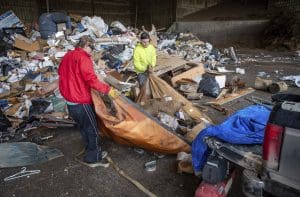Here's how the coronavirus might actually be bad for the environment
Emissions from cars and planes are down, but the environmental impact of the current crisis has a downside as well.

How the coronavirus pandemic impacts the environment may not be known for years, but experts say the outcome may be mixed.
Vehicle emissions and energy usage have fallen significantly, in part because many businesses have temporarily shut their doors. Yet emerging evidence points to a number of negative impacts from the current crisis.
Plastic bags
Many people are abandoning reusable cloth grocery bags in favor of plastic bags, the Verge reported on April 2. Shoppers are worried that the new virus could spread from reusable bags, and are opting for single-use plastic bags instead.
In addition, many grocery stores are returning to single-use bags because they are handled less, and, some argue, are safer for cashiers and other vulnerable workers.
Scientists say there is not currently any conclusive evidence that cloth bags are less safe than plastic or one-time-use bags, so long as cloth bags are washed regularly.
Americans use about 100 billion plastic bags a year, the New York Times reported in 2019, and most are not recycled. Instead, they end up in landfills or littering the land or oceans. The bags also take up to 1,000 years to fully break down.
Still, some environmentalists support the move.
“If stores, particularly workers, want to keep themselves as safe as possible and limit the bags coming in because they don’t know if people wash them, certainly a temporary pause on that, I think that’s understandable,” Ivy Schlegel, a senior research specialist for Greenpeace USA, told the Verge.
Reusable coffee cups
On March 4, Starbucks announced it would no longer allow customers to bring in reusable coffee cups for their beverages. Dunkin’, another popular coffee chain, has also stopped allowing them.
Starbucks said prohibiting reusable tumblers was part of a “series of precautionary steps in response to this emerging public health” crisis. Dunkin’ too said the move was based on “public health concerns related to the coronavirus.”
“Dunkin’ takes its job of keeping people running very seriously. While we offer a refillable cup program as an option at participating restaurants nationwide, we believe it is right to take safety precautions,” the company said in a statement in March.
Those decisions could hurt future conservation efforts. Since 1989, Starbucks has given customers a discount for using their own coffee tumblers as part of an initiative to reduce waste, according to its website. In 2011 alone, customers using their own tumblers prevented 1.4 million pounds of waste from going to landfills.
The decision by Starbucks and Dunkin’ “seems counterproductive to sustainable habit formation and the goals of companies,” Katherine White, a professor of marketing and behavioral science at the University of British Columbia, told the Wall Street Journal.
She added that the decision “gives people a potential excuse for not bringing a reusable mug in the future.”
Medical waste
The pandemic is already creating more medical waste from individuals and hospital workers. In Hong Kong, single-use face masks worn by individuals have ended up in the oceans, where animals sometimes mistake them for food, Reuters reported.
The Verge also reported that Wuhan, the region of China where the new coronavirus was first discovered, saw a six-fold increase in medical waste following the outbreak there.
In the United States, health care workers are using so much more protective equipment that hospitals are having trouble obtaining enough of it, according to a report from the Health and Human Services Department. Like single-use masks, medical waste has the potential overwhelm the system.
Thus far, medical waste companies are not having issues, but many are bracing for an increase, according to the Los Angeles Times.
“Right now, no one is kicking and screaming for help because they’re falling behind,” Anne Germain, vice president of technical and regulatory affairs for the National Waste and Recycling Association, told the Times. “But we have to be ready to respond to an increase in medical waste generated by the pandemic.”
Climate change progress
If the current pandemic leads to a global economic collapse, funding to fight climate change could drop significantly, the MIT Technology Review reported on March 9. For example, companies may not be able to access the funding needed to push forward projects related to solar or wind energy.
Further, as oil prices drop, customers may not be as willing to pay a premium for electric cars.
Additionally, political will to tackle climate change may wane as people focus more on the immediate health crisis rather than the long-term effects of climate change.
The current crisis is “going to put a pause on anything climate related,” Glen Peters, research director at the Center for International Climate Research in Oslo, told the Financial Times. “In the policy discussions for the next 6-12 months, climate is probably not going to be mentioned, it is going to be about coronavirus and economic recovery.”
Administration charges ahead
Despite these things, the Trump administration has refused to stop pressing forward on harmful environmental policies.
On April 1, the administration rolled back fuel-efficiency standards for cars and trucks, meaning new vehicles will be allowed to emit more pollution.
Trump claimed the new rule allows Americans to buy “safer, more affordable, and environmentally friendly cars,” while EPA Administrator Andrew Wheeler claimed it “strikes the right regulatory balance that protects our environment, and sets reasonable targets for the auto industry.”
Others disagreed.
“The only winner from this action is the oil industry, which wants us stuck driving dirty gas guzzlers as long as possible,” Gina McCarthy, Obama’s former EPA chief, now head of the Natural Resources Defense Council advocacy group, told the Associated Press.
A few days after that rule was finalized, the EPA announced it would move forward with a rule that would make it harder for high-quality scientific studies to be used in making environmental policies.
Such a rule “makes it easier for industry in most cases to say, ‘There’s too much uncertainty; you shouldn’t move forward'” with new regulations, Andrew Rosenberg, director of the Center for Science and Democracy at the Union of Concerned Scientists, told the New York Times.
In a March 18 letter to EPA administrator Andrew Wheeler, Rosenberg warned that “bringing this extensive proposal forward during the COVID-19 pandemic is reckless and would divert critical public health expertise from the singular mission of protecting the public and controlling the pandemic.”
“Thousands of researchers and many types of research could be impacted by the proposed rule in unique and highly specialized ways,” he added.
Published with permission of The American Independent Foundation.
Recommended

President Biden visits Prince William park to talk solar, youth involvement on Earth Day
Virginia set to receive $156 million from U.S. Environmental Protection Agency program
By Charlie Paullin, Virginia Mercury - April 23, 2024
Texas governor and attorney general do little to curb state’s chemical plant crisis
Republicans Greg Abbott and Ken Paxton have taken thousands of dollars in donations from chemical companies and their affiliated PACs.
By Jesse Valentine - December 08, 2023
‘We’ve been waiting for this’: Union workers cheer Biden’s hydrogen hub plan
Federal funding for the hub is estimated to bring over 20,000 jobs to the Pennsylvania-New Jersey-Delaware area.
By Anna Gustafson - October 17, 2023















































































